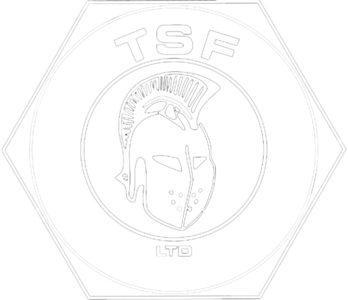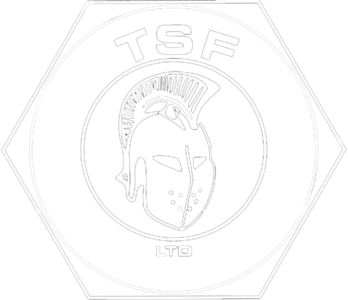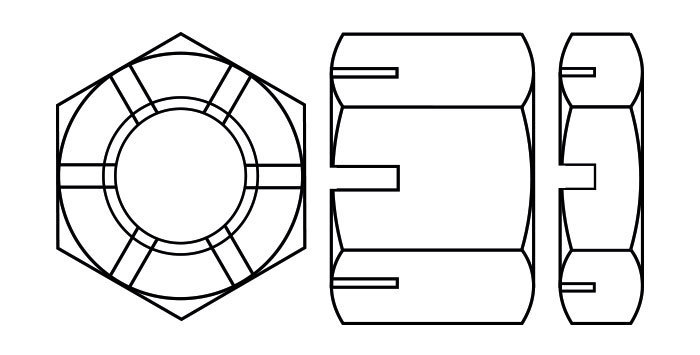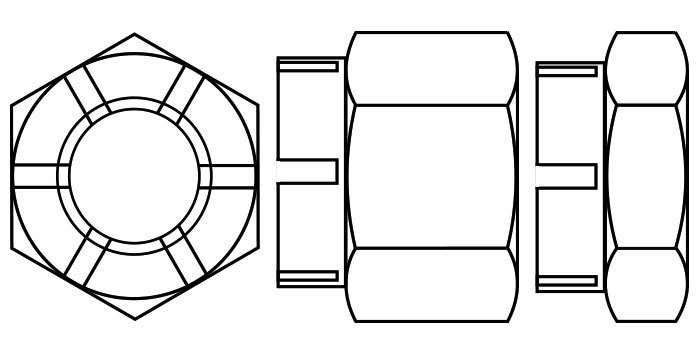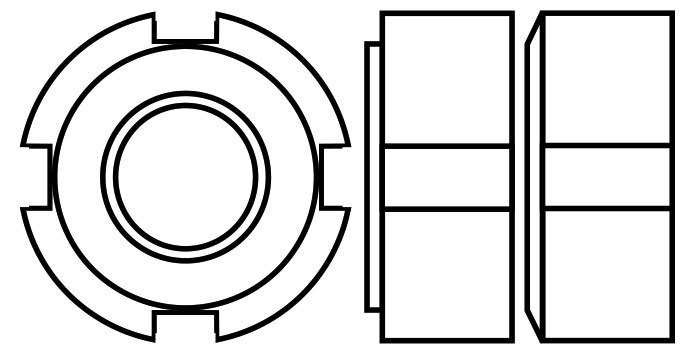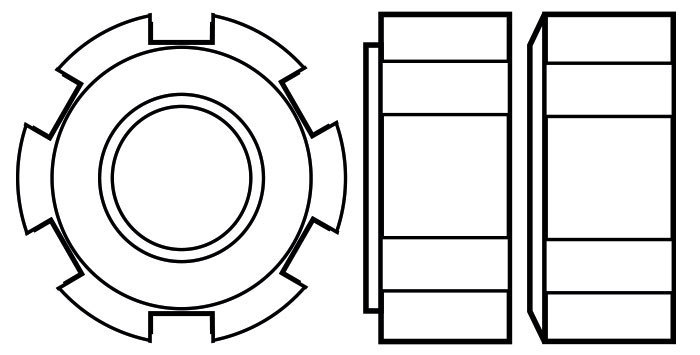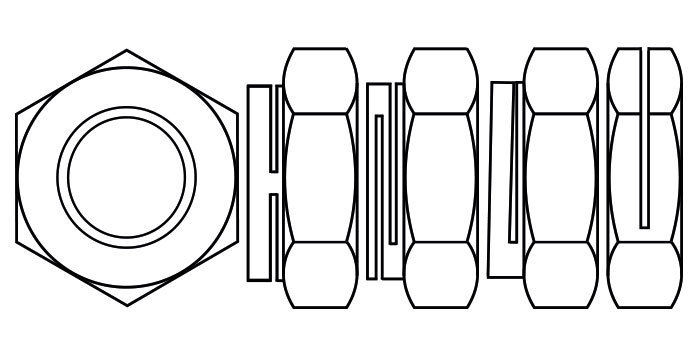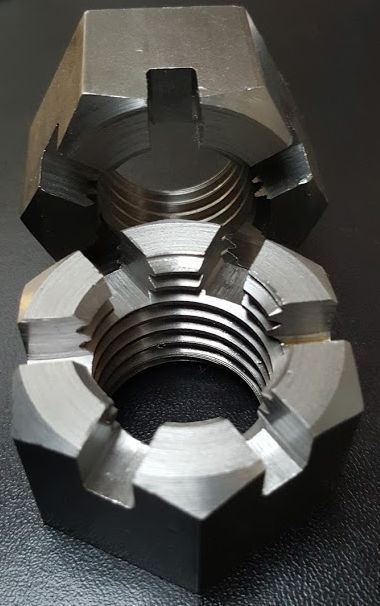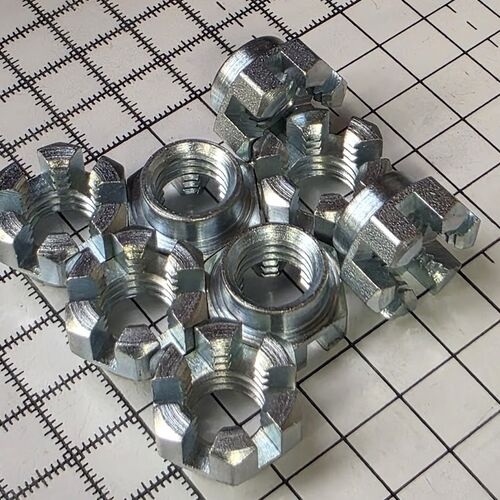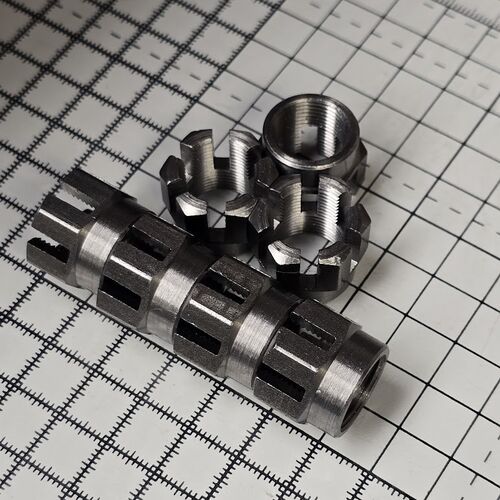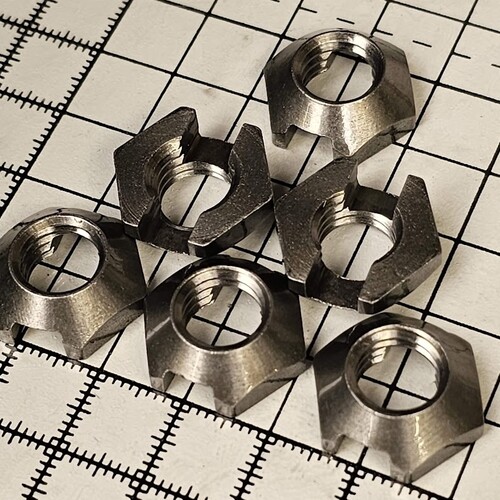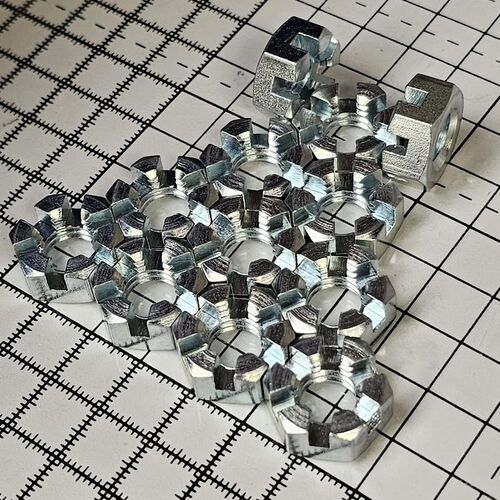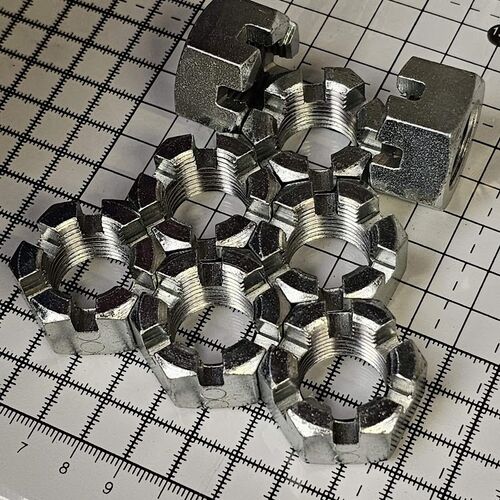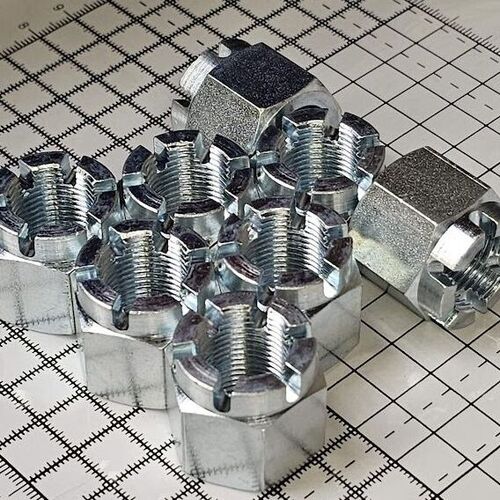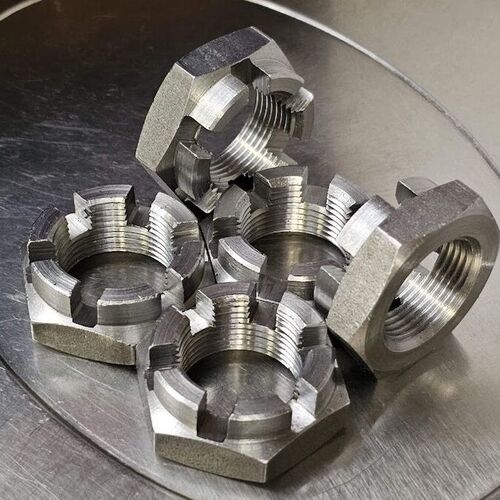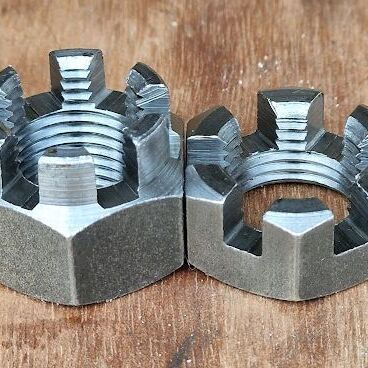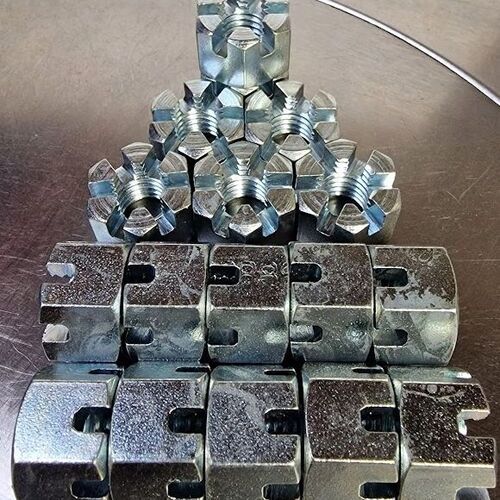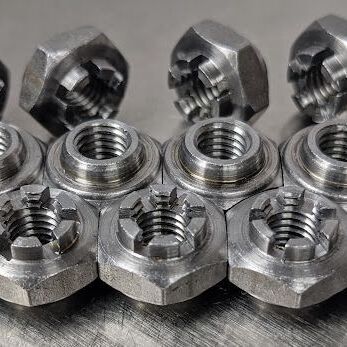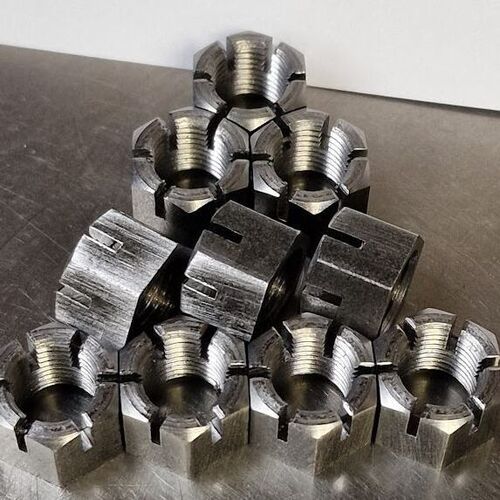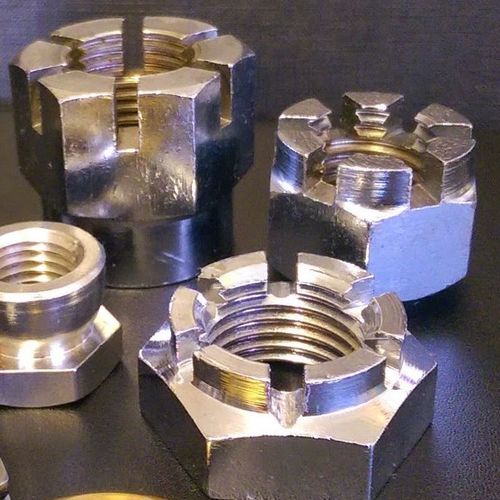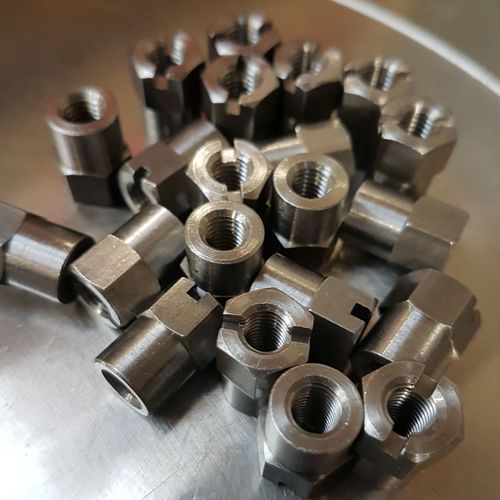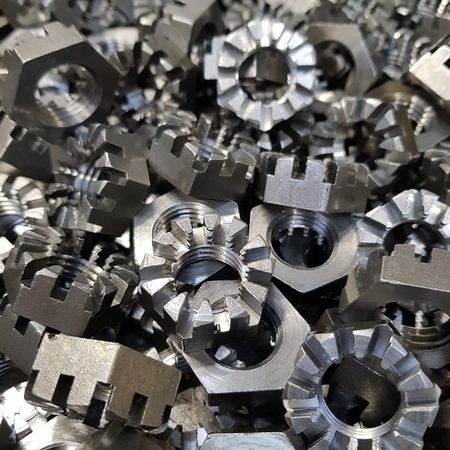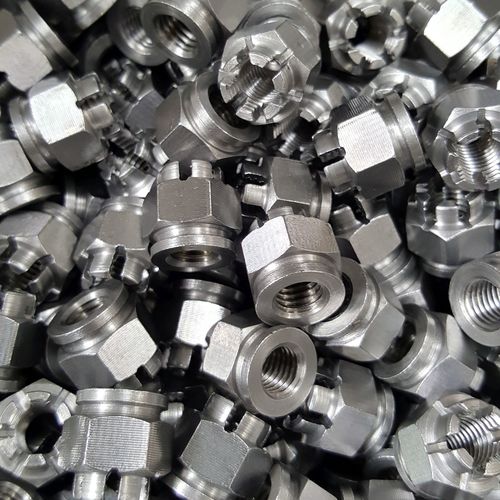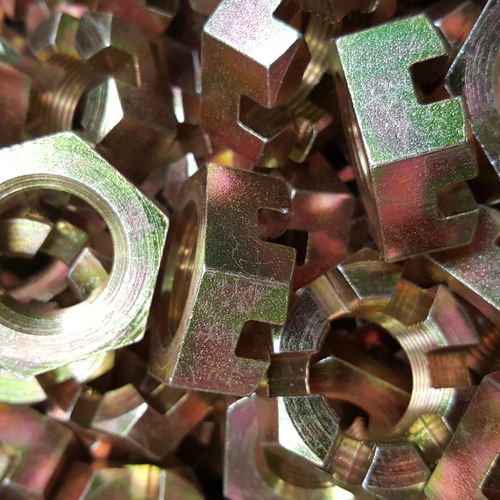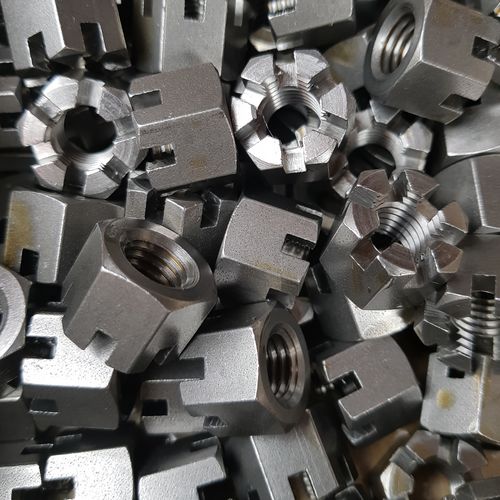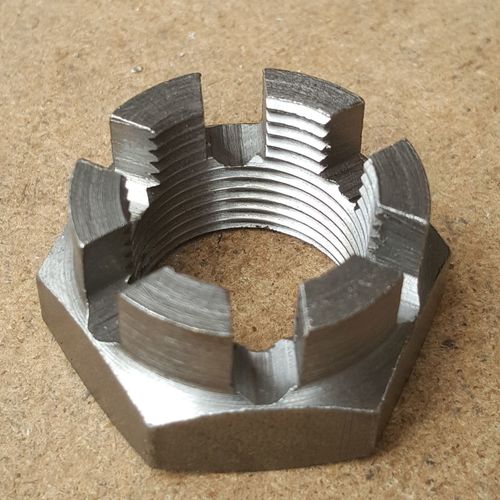Slotted & Castle Nuts
Trojan Special Fasteners Ltd can manufacture all manner of slotted and castle nuts.
Castle nuts are typically hex nuts with usually 6 slots (60 degrees apart) in a reduced diameter round section above the wrenching part. When a castle nut (or any radially slotted nut) is applied to a threaded section, it is tightened so that it's slot is aligned with a predrilled hole in the bolt or threaded rod, into which a cotter pin, split pin, a lock wire or a spring pin is typically inserted to stop the nut from rotating.
These kind of nuts are unsuitable when a specific preload is required because the torque can’t be fine-tuned – a result of rotating a nut to align it with a hole for pin insertion. Additionally, such nuts require an additional component and alignment time.
Typically split pins, cotter pins, R clips or safety wires can be used to stop the castle nut from loosening.
Castellated, slotted and castle nuts are commonly used on axles and are even called axle nuts in some applications. Sometimes they are used on trailers too. They are also used as hub nuts which hold the driveshaft within the wheel hub assembly.
In addition to standard preferred sizes, we also manufacture non preferred and non standard or special thread and nut forms and sizes. If you have a drawing, or a sample Trojan Special Fasteners Ltd will make what you want.
We can manufacture from single quantities all the way up to the thousands.
Predominantly these forms exist:
1. Radially slotted nuts
2. External groove slotted nuts
These are also known as roller bearing nuts and are fastened with a hook spanner. They have one washer bearing face and depending upon the size, they can have between 2 to 8 equally spaced external slots.
Hook spanners are defined by DIN 1801A standard which give specific internal diameter, hook size and wrenching length, in order to apply the correct amount of torque for nut application and removal.
3. Axially slotted nuts
Axially slotted nuts (like those pictured above) are typically used as all metal prevailing torque type nuts, where the axial slots are used to create a section that can deform the thread by pressing the top parts down. This increases friction between mating threads and thus increases the application and subsequent removal torque of such nuts. Being all-metal these nuts are not subject to chemical and temperature limitations of their nylon insert counterparts.
There is frictional interference between the threads of mating components which creates resistance that is called prevailing torque. This type of nut can be reused, but only a limited number of times.
These are very useful in applications where there is a degree of vibration that would loosen regular nuts that have not had their threads locked by another mechanism. However, this axially slotted type of nut is typically only one-way.
Please note that Trojan Special Fasteners Ltd does not manufacture trademarked fasteners unless by order of the trademark holder.
Trojan Special Fasteners can axially slot and deform nuts to provide a prevailing torque feature on your nuts – as no open standard for these exists we would ask that you provide your dimensions or a drawing and we can manufacture to that. Additionally, we can torque test most of your nuts for you, just provide us with the female threaded part and we’ll take care of the rest!
Frequently Asked Questions
What are slotted nuts used for?
Castle and slotted nuts are primarily locking nuts, which means that once they are fixed they are designed to lock into position. This is achieved by using a cotter, split or taper pin or wire which winds around the castle or slotted portion of the nut and through a pre-drilled hole in either a bolt or portion of threaded rod. In this way, the pin stops the nut from moving free by virtue of it impeding the nut's movement due to the slots it passes through.
What is the difference between a castle nut and a slotted nut?
The primary difference is that castle nuts have a turned-down (turret) portion on the slotted end. With a castle nut, a pin can be wound round and pinned against the turret portion in order for the pin not to stick out too much. Otherwise castle and slotted nuts are effectively the same thing.
Why do castle and slotted nuts have slots?"
Castle nuts and slotted nuts have slots so that they can accommodate a cotter, split or taper pin or wire, which prevents the nut from loosening.
Why Use Castle Nuts?
When it comes to securing bolts and other fasteners, it's important to choose the right type of nut to ensure a strong and reliable connection. Castle nuts, also mistakenly known as slotted nuts, are a popular option for many applications due to their unique design and effective locking capabilities. In this article, we'll delve into the benefits of using castle nuts and why they're a wise choice for many applications.
Unique Design Provides Enhanced Security
Castle nuts have a distinctive design that sets them apart from other types of nuts. The nut features a series of slots or notches cut into the end, allowing a cotter pin or wire to be inserted through the slots and bent over to create a secure lock. This design provides added security compared to other types of nuts, as the cotter pin or wire helps to prevent the nut from loosening over time.
Ideal for High-Vibration Applications
One of the key benefits of using castle nuts is their ability to withstand high levels of vibration. The locking mechanism created by the cotter pin or wire helps to prevent the nut from loosening even in applications that experience frequent vibrations or movements. This makes castle nuts an ideal choice for applications such as machinery, vehicles, and other equipment that may be exposed to high levels of vibration.
Versatile and Easy to Install
Castle nuts are a versatile choice that can be used with a variety of fasteners, including bolts, screws, and studs. They're also relatively easy to install, as the slots in the nut allow for easy alignment with the cotter pin or wire. This makes them a convenient option for both professionals and DIY enthusiasts who need a reliable and secure fastening solution.
Robust and Durable
In addition to their unique design and effective locking capabilities, castle nuts are also known for their strength and durability. They're made from strong, high-quality materials such as steel or stainless steel, and are built to withstand heavy loads and exposure to harsh environments. This makes them a wise choice for applications that require a reliable and long-lasting fastening solution.
Cost-Effective Option
Another advantage of using castle nuts is their cost-effectiveness. Compared to other types of nuts and fastening solutions, castle nuts are relatively inexpensive and provide excellent value for money. They're an ideal choice for those who need a reliable and cost-effective fastening solution for their projects or applications.
Conclusion
In conclusion, castle nuts are a versatile, reliable, and cost-effective fastening solution that provides enhanced security and protection against high levels of vibration. With their unique design, robust construction, and ease of installation, they're a wise choice for many applications and projects. Whether you're a professional mechanic or a fastener distributor, consider using castle nuts for your next fastening project and experience the benefits for yourself.
We can manufacture to the following specifications:
| Standard | Description |
|---|---|
| ASME/ANSI B18.2.2 | Heavy hex slotted nuts, table 11 |
| ASME/ANSI B18.2.2 | Hex slotted nuts |
| ASME/ANSI B18.2.2 | Hex slotted nuts, table 5 |
| ASME/ANSI B18.2.2 | Hex slotted nuts, table 7 |
| ASME/ANSI B18.2.2 | Hex thick slotted nuts |
| BS 1083 | Hexagon castle nuts |
| BS 1083 | Hexagon slotted nuts |
| BS 1768 | Hexagon thick slotted nuts - unified threads |
| BS 1768 | Thick hexagon slotted nuts |
| BS 1768 | Thin hexagon slotted nuts |
| BS 1769 | Hexagon black slotted nuts - unified threads |
| BS 1769 | Hexagon heavy black slotted nuts - unified threads |
| BS 3692 | Hexagon castle nuts |
| BS 3692 | Hexagon slotted nuts |
| BS 7764 | Hexagon castle nuts |
| BS 7764 | Hexagon slotted nuts |
| DIN 1804 | Slotted round nuts |
| DIN 546 | Slotted round nuts |
| DIN 70852 | Slotted groove nuts nuts |
| DIN 935-1 | Hexagon castle nuts |
| DIN 935-1 | Hexagon slotted nuts |
| DIN 935-3 | Hexagon slotted nuts |
| Standard | Description |
|---|---|
| DIN 937 | Hexagon thin castle nuts |
| DIN 937 | Hexagon thin slotted nuts |
| DIN 979 | Hexagon thin castle nuts |
| DIN 979 | Hexagon thin slotted nuts |
| DIN 981 | Slotted round lock nuts |
| ISO 13754 | Hexagon slotted nuts |
| ISO 288-1 | Hexagon castle nuts |
| ISO 288-1 | Hexagon slotted nuts |
| ISO 7035 | Hexagon castle nuts |
| ISO 7035 | Hexagon slotted nuts |
| ISO 7038 | Thin hexagon castle nuts |
| ISO 7038 | Thin hexagon slotted nuts |
| NF E22-111 | Heavy series slotted round lock nuts |
| NF E25-411 | All metal prevailing torque hexagon nuts with slots - HFR |
| NF E27-413 | Slotted round cylindrical nuts |
| NF E27-414 | Hexagon castle nuts |
| UNI 5593 | Hexagon castle nuts |
| UNI 5593 | Hexagon slotted nuts |
| UNI 5594 | Low Hexagon castle nuts |
| UNI 5594 | Low Hexagon slotted nuts |
| UNI 5595 | Hexagon castle nuts |
| UNI 5595 | Hexagon slotted nuts |
